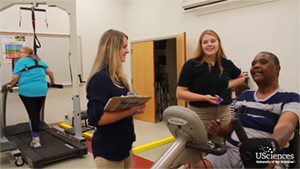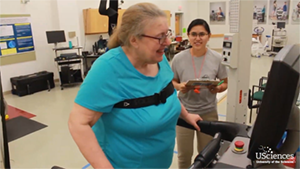PT Research Adapts to Provide Safe Patient Care During the Pandemic

Editor's note: This article was written prior to University of the Sciences' merger with and into Saint Joseph's University and does not reflect the current, combined institution. References to programs, offices, colleges, employees, etc., may be historical information.
As COVID-19 has continued to disrupt higher education, faculty and students at USciences have had to adapt, both in the classroom and in their research. In Samson College’s Department of Physical Therapy, Greg Thielman PT, MSPT, ATC, EdD and Margie Roos PT, DPT, PhD, found a creative solution to give their students clinical research experience while complying with COVID-19 guidelines.
Drs. Thielman and Roos, along with five Doctor of Physical Therapy students, adapted an in-person research project using exercise to improve cognition into a successful telehealth program entitled Surviving Stroke: Telehealth Exercise & Rehabilitation for Philadelphians with Stroke.
 “Physical therapy is a profession where we are very hands on. One thing I am super proud of is that we’re still doing research,” Dr. Roos said. “Exercise is so important for people who have had a stroke and the unique exercises we do challenge them physically and cognitively. The group also included healthy older adults to act as a comparison group.”
“Physical therapy is a profession where we are very hands on. One thing I am super proud of is that we’re still doing research,” Dr. Roos said. “Exercise is so important for people who have had a stroke and the unique exercises we do challenge them physically and cognitively. The group also included healthy older adults to act as a comparison group.”
Prior to the pandemic this research was done as on-campus exercise class as part of the pro bono physical therapy clinic, but when classes were halted, that was no longer an option. Drs. Thielman and Roos had to find a way to adapt.
“We gained institutional review board (IRB) approval to safely and appropriately perform testing online for our healthy older adults, and then for our individuals who were post strokes we [Drs. Thielman and Roos] went into their homes to do the pre and post testing activities,” explained Dr. Thielman.
The exercise program, which follows the Ageless Grace Brain Health Fitness program, focuses not only on improving physical health, but cognitive health which is so important in older adults and patients who have experienced a stroke. Dr. Roos said that this combination provides patients with a level of skilled care that cannot be found in every rehabilitation program.
Due to concerns with the pandemic, people with stroke were unwilling to leave their homes which challenged Drs. Thielman and Roos to find new ways to complete the evaluations. “We would go to their apartment and do it in their lobby, outside, or in areas of their house where there was more space,” Dr. Roos shared.
 When making adaptations to the research, patient safety was at the forefront. “We had to integrate new safety measures and screening processes to ensure that the participants selected were able to perform all tests and classes safely at home,” said Simran Sangu DPT’21, a student who worked on this research with Drs. Thielman and Roos.
When making adaptations to the research, patient safety was at the forefront. “We had to integrate new safety measures and screening processes to ensure that the participants selected were able to perform all tests and classes safely at home,” said Simran Sangu DPT’21, a student who worked on this research with Drs. Thielman and Roos.
As the research team worked to make the switch to telehealth, another challenge arose- technological literacy.
“At times, subjects participating in the study had technological difficulties which required our attention and we spent time to help them be present during our exercise classes,” said Amy Hickman DPT’21, another student researcher on this study. “It took commitment and dedication to maintain our communication with subjects in the study in order to complete this project successfully.”
The team plans to publish the research with the hope that their procedures can help other researchers facing similar issues.
"We plan on publishing our procedures so that it can help the next group."
Margie Roos, PT, DPT, PhD
“When [Dr. Thielman] and I looked into what people were doing, there was nothing out there,” said Dr. Roos. “We plan on publishing our procedures so that it can help the next group.”
Both Sangu and Hickman shared that participating in this research study with a heavy focus on telehealth was an overall positive experience, citing gaining experience with telehealth and patient comfort and safety as advantages to the adapted program.
“This project has helped prepare me for my future career as a physical therapist by allowing me to become more versatile in providing services to my future patients,” Hickman explained.
“It was a great experience to be a part of this study and learn from Dr. Roos and Dr. Thielman. They are both very knowledgeable regarding stroke research and made this a great, enjoyable learning experience for me,” said Sangu.
